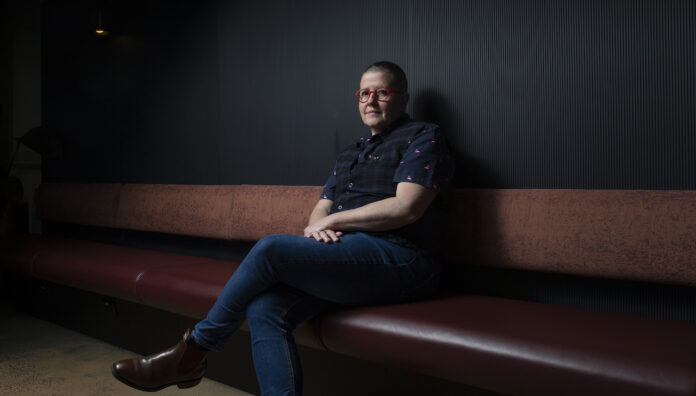
Professor Lisa Nissen FPS, Director of the Health Workforce Optimisation Program at the University of Queensland, is a role model for the LGBTQIA+ community in pharmacy and health care.
What inspired you to become a pharmacist?
It wasn’t my first choice. I wanted to be a professional golfer. But my family felt a university education and career would be for a lifetime. For lots of reasons I chose “science” at UQ. At college I started hanging out with a bunch of people studying health professions like medicine, physiotherapy, and occupational therapy (OT). I started going to their classes instead of mine, which didn’t help with my GPA, but I really enjoyed it. I decided to apply to transfer into OT the following year, putting pharmacy as my second preference. As fate would have it, I just missed out on OT and landed in pharmacy. From there I quickly found my feet.
Have you faced discrimination in your career?
At university I wasn’t ‘out’. The early 90s still wasn’t a safe time to be gay. In mid-second year, we had a tutorial on professional and ethical conduct, being gay was used as an example of “conduct unbecoming the profession”. I thought, ‘my god what have I done!’ I stayed firmly in the “closet”. The anxiety of constant hiding made me decide that once I was qualified, I would be true to who I was – and let the chips fall as they would.
Consequently, I’ve faced discrimination (career progression, work opportunities). Like many LGBTQIA+ people, I’ve been physically and verbally threatened in my workplace. I’ve also worked with amazing, generous people who have not only embraced my rainbow colors but used them as a super-power!
Any advice for others in the community after your experiences?
I think you must be true to yourself and who you are. And I appreciate the complexity that comes with that for everyone individually. But, in my experience, if you are in healthcare, I don’t think you can really contribute fully to patients and the community if you don’t feel that you’re the true you. It’s not easy or straightforward, but I think there are plenty of great role models generally for young (and not so young) people now and examples of people in pharmacy and healthcare who are doing great things.
What career achievement makes you most proud?
Vaccination for pharmacy and my involvement in the COVID-19 Vaccination Taskforce is my absolute career highlight. For pharmacists it was a game changer in terms of opening the doors for prescribing and other scope of practice opportunities. And for me, it gave me an amazing opportunity to work with such great and committed people – a once in a lifetime experience! Pharmacists were there when they were really needed and if we hadn’t continued when things got ugly, millions of people wouldn’t have been vaccinated.
What about the hype around increases to scope of practice with your involvement in UTIPP-Q?
We’ve been transparent about what the data says in all our UTIPP-Q work regarding the impact of the services, the contribution to the community and the quality and safety of the service that pharmacists have provided. All I can show and present to people is the data sets that we saw, the experiences of the patients and the outcomes we had – all publicly available. If someone has a concern, let’s talk about how we can make it better, make it safe, improve communication, improve collaboration, and improve our processes. At the end of the day, the health system needs everyone to work to the full extent of their competency and capability.
What advice do you have for ECPs?
Work on getting a team – have people around you to bring a variety of different and interesting things to your life, who will support you. Your team can be a mix of professionals, your school or university friends, and social acquaintances – people you meet over time. They may lead you to mentors, career opportunities, and support your life generally. Think about who’s in your team – people who love you for who you are. I love my team.



 John Jones MPS, pharmacist immuniser and owner of My Community Pharmacy Shortland in Newcastle, NSW[/caption]
John Jones MPS, pharmacist immuniser and owner of My Community Pharmacy Shortland in Newcastle, NSW[/caption]


 Debbie Rigby FPS explaining how to correctly use different inhaler devices[/caption]
Debbie Rigby FPS explaining how to correctly use different inhaler devices[/caption]




 Professor Sepehr Shakib[/caption]
Professor Sepehr Shakib[/caption]

 Lee McLennan MPS[/caption]
Lee McLennan MPS[/caption]
 Dr Natalie Soulsby FPS, Adv Prac Pharm[/caption]
Dr Natalie Soulsby FPS, Adv Prac Pharm[/caption]
 Joanne Gross MPS[/caption]
Joanne Gross MPS[/caption]







